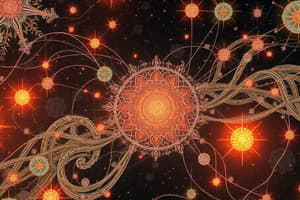Podcast
Questions and Answers
Name two ways that friction is helpful in our daily life?
Name two ways that friction is helpful in our daily life?
Friction allows us to walk and helps objects stop rolling.
Describe two examples of how a force can change an object.
Describe two examples of how a force can change an object.
A force can make a stationary object start moving, and it can also change the shape of an object such as squeezing a ball.
How is a magnet used in a refrigerator?
How is a magnet used in a refrigerator?
A magnet is used to keep the refrigerator door tightly shut.
What is an electromagnet and when does it act like a magnet?
What is an electromagnet and when does it act like a magnet?
Explain how force can affect an object that is already in motion.
Explain how force can affect an object that is already in motion.
What is the name of the rock that can pull iron objects towards itself, discovered in Magnesia?
What is the name of the rock that can pull iron objects towards itself, discovered in Magnesia?
Name three materials that are attracted by magnets.
Name three materials that are attracted by magnets.
What are the ends of a magnet called and where is the magnetic force strongest?
What are the ends of a magnet called and where is the magnetic force strongest?
Describe what will happen when you bring two south poles of different magnets together.
Describe what will happen when you bring two south poles of different magnets together.
What term describes the action of a magnet when it causes a magnetic object to move towards it?
What term describes the action of a magnet when it causes a magnetic object to move towards it?
What is a force in the context described in the text?
What is a force in the context described in the text?
What kind of force slows down or stops a moving object?
What kind of force slows down or stops a moving object?
Are gold and paper magnetic materials or non-magnetic materials?
Are gold and paper magnetic materials or non-magnetic materials?
Flashcards
What is a magnet?
What is a magnet?
A special type of rock that attracts certain metals.
What are magnetic materials?
What are magnetic materials?
Materials that are attracted to magnets, like iron, nickel, cobalt, and steel.
What are non-magnetic materials?
What are non-magnetic materials?
Materials that are not attracted to magnets, like gold, silver, aluminum, copper, wood, paper, plastic, glass, and clay.
What are the poles of a magnet?
What are the poles of a magnet?
Signup and view all the flashcards
What happens when like poles of magnets are brought together?
What happens when like poles of magnets are brought together?
Signup and view all the flashcards
What happens when unlike poles of magnets are brought together?
What happens when unlike poles of magnets are brought together?
Signup and view all the flashcards
What is a force?
What is a force?
Signup and view all the flashcards
What is friction?
What is friction?
Signup and view all the flashcards
What is an electromagnet?
What is an electromagnet?
Signup and view all the flashcards
How are magnets used in everyday life?
How are magnets used in everyday life?
Signup and view all the flashcards
What are the effects of a force?
What are the effects of a force?
Signup and view all the flashcards
Study Notes
Magnets
- Magnets are special stones (natural) or objects made of iron or steel (man-made) that interact with some metals.
- Different shapes and sizes of man-made magnets exist, including U-shaped, horseshoe, bar, rod, ring, and button magnets.
- Magnets attract certain materials (magnetic materials).
- Iron, nickel, cobalt, and steel are magnetic materials.
- Nails and paper clips are examples of magnetic materials.
- Non-magnetic materials are not attracted to magnets, examples include gold, silver, aluminium, copper, wood, paper, plastic, glass, and clay.
- Magnets have two poles: a north pole (N) and a south pole (S).
- The strongest force of a magnet is at its poles, and the weakest is at its center.
- Like poles (N-N or S-S) repel each other.
- Unlike poles (N-S) attract each other.
- A force is a push or pull applied on an object, causing interactions.
- Friction is a force that slows or stops moving objects.
- Forces can change an object's motion (speed and/or direction), start a stationary object moving, or change its shape or size.
- Forces can also cause a moving object to stop.
Electromagnets
- Electromagnets are temporary magnets that act as magnets when electricity flows through them.
Studying That Suits You
Use AI to generate personalized quizzes and flashcards to suit your learning preferences.




